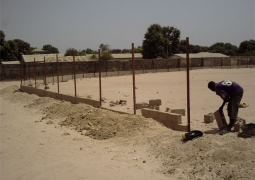The executive director of the National Environmental Agency (NEA), Ndey Sireng Bakurin, has disclosed that since joining GEF, the Gambia has received from GEF grant totaling US$28 million that leveraged US$90 million in co-financing resources for 16 national projects.
The project includes biodiversity, climate change, water, land degradation, energy and chemical management.
She said The Gambia participated in 20 regional and global projects financed by the GEF totaling US$163 million that leveraged US$361 million in co-financing resources.
These included six projects in biodiversity, five in climate change, four in land degradation, two in international waters, two in persistent organic pollutions, and one in multi-focal areas.
Mrs Ndey Sireng Bakurin was speaking at a two-day national consultative seminar for the sustainable dry land forest management project held at Laico Atlantic Hotel in Banjul organised by the Department of Forestry under the Office of the President with support from the Food and Agriculture Organization.
According to her, the current GEF-5 replenishment periods July 2010 to June 2014, The Gambia received an indicative to formulate and execute projects for USD1.5 million in biodiversity, USD2 million in climate change, and USD4.6 million in land degradation.
The sustainable dry land forest management project was also part of the land degradation allocation, she said, adding that the project would build on the already implemented and ongoing projects with the objective of addressing the gaps in institutional and community-level capacities for effective and sustainable forest management.
She said it is expected to include areas under community forestry which has been very effective in The Gambia in addressing unsustainable resources use.
The Rio 20 conference was recognised for the need for urgent action to reverse land degradation and commitment to strive to achieve a land degradation neutral world in the context of sustainable development, she added.
She added that this was an inspirational goal and a provision that needed to be translated into an operational goal and deliverable targets.
“The Department of Forestry in partnership with NEA and other shareholders will be implementing this important project. It is worth mentioning that NEA continues to work closely with all stakeholders at all levels to address the environmental and sustainable development efforts needed,” she added.
The agency was pleased to support this project and keenly interested in the outcomes of this workshop and implementation of the project, she stated.
The NEA boss further noted that the degradation of the natural environment has serious economic and social consequences; disruption to the natural balance and to the ecosystem services it provides to humankind, which also poses a threat to human wellbeing.
She noted that one of the major environmental problems faced by The Gambia is the degradation of forests.
Therefore, she added, the Gambia government as, in line with its national priorities and their commitment to the relevant global environmental conventions, endorsed the preparation in the implementation of the sustainable dry land management Project.



